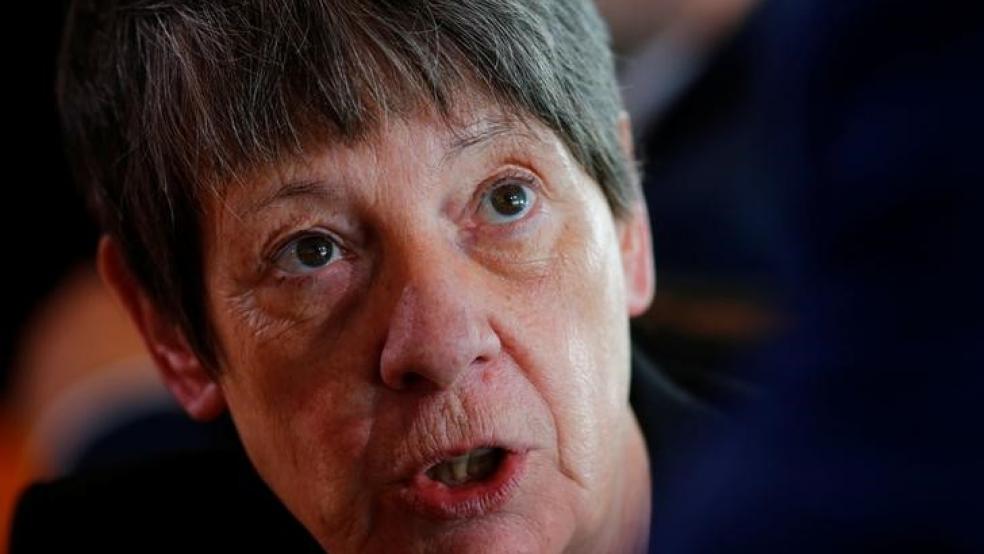BERLIN (Reuters) - Germany said on Wednesday that euro zone members should first agree on clear parameters for reducing risks in the banking sector before progress can be made toward completing a banking union through a deposit insurance scheme in the currency bloc.
Reforming the euro zone has become a priority since the election last year of French President Emmanuel Macron, who hopes Chancellor Angela Merkel will have a government in place by the end of March to help move his ambitions ahead.Germany's acting finance minister, Peter Altmaier, played up the chances of progress toward a banking union that is considered necessary to shield the euro zone from future crises.But, speaking after meeting Eurogroup head Mario Centeno of Portugal in Berlin, Altmaier declined to give a timeline, saying that Germany wanted clarity on risk sharing and risk reduction."In the last two Eurogroup meetings, we agreed to try to come to a common understanding over the next few weeks about what we mean by risk reduction and what steps are needed for this," said Altmaier, a confidante of Merkel.The European Commission late last year offered a watered-down plan to decrease risks in the banking sector, in a bid to break years of stalemate over the plan that was fiercely opposed by Germany's former finance minister, Wolfgang Schaeuble.But with Schaeuble gone after an election in September that weakened Merkel's conservatives, new momentum for euro zone reforms is building, especially as Merkel seeks a coalition with the anti-austerity Social Democrats (SPD).The Commission's so-called European deposit insurance scheme (EDIS) is meant to cover insured savers (up to 100,000 euros) in case of a bank failure.The Commission said the scheme should be introduced more gradually than initially planned and discarded initial plans for a full sharing of depositor protection.Germany is concerned that with high ratios of bad loans in banking sectors across Europe, German savers may be first to be asked to help pay depositors elsewhere.RISK REDUCTIONAsked about when EDIS would be introduced, Altmaier said: "We first must reduce risks before there can be risk sharing. Therefore, from our point of view and from today's perspective, there cannot be a fixed date."In a speech at the Finance Ministry shortly after the news conference with Altmaier, Centeno said that in addition to the banking union, the bloc should have a "fiscal capacity" which would help countries tackle crises not of their own making."This process does not need to come with a cost for domestic insurance schemes, but needs to be seen in a complementary way." he said, seeking to assuage German fears. "I believe a first step of a long, step-by-step, controlled process will be enough to generate a new wave of confidence in the markets."He added: "To be clear: a common fiscal capacity does not entail permanent transfers – there are no proposals aiming at that. And it has to be designed in a way to avoid moral hazard".Altmaier will also discuss how to improve governance of the 19-member single currency bloc with his French counterpart, Bruno Le Maire, on Thursday in Paris.Merkel will meet IMF chief Christine Lagarde on Friday in Berlin before travelling to Paris where she is expected to discuss euro zone reforms with Macron.Merkel’s conservatives and the SPD last week agreed on the blueprint for a governing coalition.The draft raised the prospect of an "investment budget" for the single currency bloc, a nod to Macron's call for a budget to help the euro zone cope with external economic shocks.It also calls for the ESM bailout mechanism to be turned into a full-blown European Monetary Fund under parliamentary control and anchored in EU law.SPD delegates will vote on Sunday on whether party leaders should proceed to formal negotiations with the conservatives on forming a coalition government that will secure Merkel a fourth term. (Additional reporting by Gernot Heller and Tom Koerkemeier in Berlin and Jan Strupczewski in Brussels; Writing by Joseph Nasr; Editing by Robin Pomeroy)Germany demands clarity on risk reduction for banking union

HANNIBAL HANSCHKE



